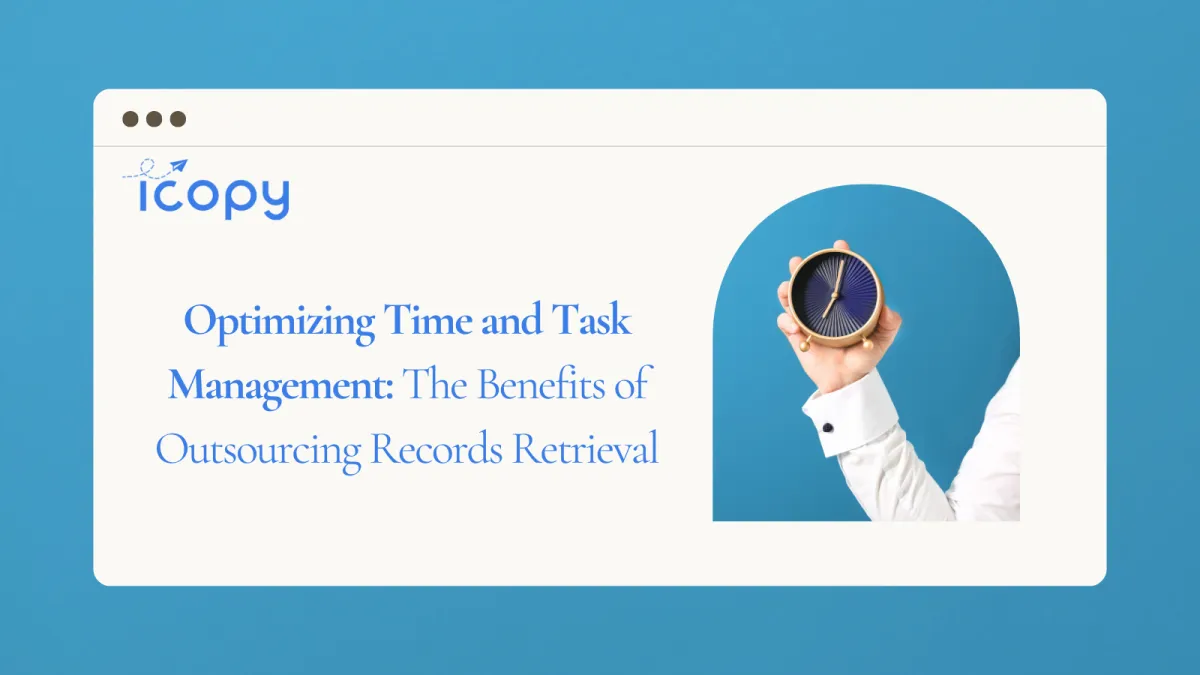Blog
Your inside news on record retrieval for legal firms - plus business tips to help scale your practice.

Optimizing Time and Task Management: The Benefits of Outsourcing Records Retrieval
Managing tasks effectively is crucial to the success of any law firm, especially when dealing with the intricate and time-consuming process of records retrieval. From sending affidavits and ensuring due diligence to communicating with medical offices and preparing documents for court, the demands on a legal team's time can be overwhelming. Outsourcing records retrieval can offer significant time savings, allowing your firm to focus on the strategic aspects of your cases while ensuring that the administrative tasks are handled efficiently.
This blog will break down the typical time commitments involved in managing records retrieval in-house and demonstrate how outsourcing these tasks can optimize your firm’s time management and overall efficiency.
The Time-Intensive Process of In-House Records Retrieval
Managing records retrieval in-house involves a series of detailed and often repetitive tasks. Here’s a realistic breakdown of the time commitments associated with each step:
Sending Affidavits and Request Forms
Time Commitment: 10-20 minutes per request
Details: Drafting, reviewing, and sending affidavits or request forms to various locations is often the first step. This includes ensuring that all the necessary paperwork is included and accurate, which can take 10-20 minutes per request.
Due Diligence
Time Commitment: 20-30 minutes per request
Details: Conducting due diligence involves verifying the correctness of the request, before it is sent out or to resolve errors if they come back. This typically takes 20-30 minutes per request.
Follow-Ups and Communicating with Medical Offices and Other Locations
Time Commitment: 2-4 hours per request
Details: Follow-ups focuses on responding to requests for more information and working with clinics to get accurate information needed for the case. Ongoing communication with medical offices or other record-holding locations is crucial for clarifying requests, addressing any issues, and ensuring timely responses. Follow-up time frames vary depending on the complexity of the request and the responsiveness of the location, but on average can take 2-4 hours per request.
Receiving Documents, OCR’ing and Bates Stamping
Time Commitment: 1-2 hours per request
Details: Once the documents are received, they need to be thoroughly reviewed, organized, and prepared for further processing. This includes checking for completeness and accuracy, OCR processing to make them searchable, followed by bates stamping to ensure proper documentation.
Follow-Ups for Non-Responsive Locations
Time Commitment: 1-2 hours per request
Details: For locations that do not respond in a timely manner, persistent follow-up is required. This can involve multiple attempts via phone calls, emails, or even faxes, consuming a significant amount of time.
Total Time Commitment for In-House Records Retrieval
Estimated Total Time: 5 ½ - 9 hours per request
For a single records retrieval request, a law firm could spend upwards of 6 to 10 hours managing the process in-house. Considering that law firms often handle multiple records requests simultaneously, the cumulative time spent on these administrative tasks can be substantial, detracting from the time available for more strategic legal work.

The Benefits of Outsourcing Records Retrieval
Outsourcing records retrieval offers a practical solution to the time constraints faced by law firms. Here’s how outsourcing can optimize time management:
Reduced Administrative Burden
Outsourced Time Commitment: 30 minutes - 2 hours per request (for review and final preparation)
By outsourcing, the time your team spends on administrative tasks is significantly reduced. The service provider handles the drafting, follow-ups, communication, and preparation, allowing your team to focus on the final review and preparation for court, which typically takes much less time.
Faster Turnaround Times
Improved Efficiency: Outsourced providers have dedicated teams and established relationships with record-holding locations, which often results in faster document retrieval. This means less time spent waiting for responses and more time available for case strategy.
Expertise and Accuracy
Minimized Errors: Outsourcing to a specialized provider ensures that the records are handled by experts who are familiar with the nuances of legal documentation. This reduces the likelihood of errors, omissions, or the need for follow-up corrections, saving time and reducing stress.
Scalability
Time Flexibility: As your caseload increases, an outsourced provider can scale their services to meet your needs without overburdening your in-house team. This scalability ensures that no matter how many requests you have, each one is handled with the same level of efficiency.
Cost-Effective Use of Time
Focus on Core Tasks: With the time saved from outsourcing, your legal team can focus on higher-value tasks such as case analysis, client interaction, and court preparation. This not only improves productivity but also enhances the overall success of your cases.
Conclusion: The Strategic Advantage of Outsourcing
Outsourcing records retrieval is more than just a time-saving measure—it’s a strategic decision that allows law firms to optimize their operations and focus on what truly matters: delivering the best possible outcomes for their clients. By entrusting the administrative aspects of records retrieval to a specialized provider, your firm can significantly reduce the time spent on these tasks, improve efficiency, and ultimately achieve greater success in your legal work.
At iCopy Legal, we understand the demands of the legal industry and are here to support you with reliable, efficient, and expert records retrieval services. Let us handle the time-consuming tasks, so you can concentrate on your core responsibilities and take your cases to the next level.
Copyright © 2023 iCopy Legal

